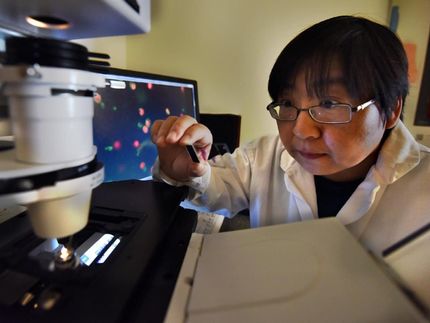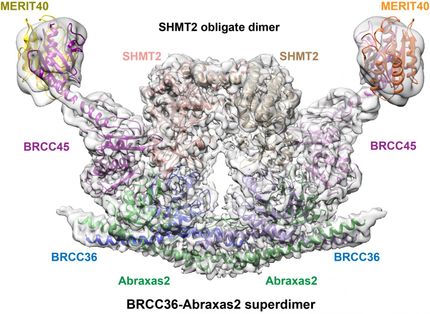Protein made by breast cancer gene purified
Advertisement
A key step in understanding the origins of familial breast cancer has been made by two teams of scientists at the University of California, Davis. The researchers have purified, for the first time, the protein produced by the breast cancer susceptibility gene BRCA2 and used it to study the oncogene's role in DNA repair. The results are published in the Nature and Nature Structural and molecular biology. They open new possibilities for understanding, diagnosing and perhaps treating breast cancer.
BRCA2 is known to be involved in repairing damaged DNA, but exactly how it works with other molecules to repair DNA has been unclear, said Stephen Kowalczykowski, distinguished professor of microbiology in the UC Davis College of Biological Sciences, UC Davis Cancer Center member and senior author of the Nature paper.
"Having the purified protein makes possible far more detailed studies of how it works," Kowalczykowski said.
Kowalczykowski's group has purified the protein from human cells; another group led by Professor Wolf-Dietrich Heyer, also in the UC Davis Department of Microbiology and leader of the Cancer Center's molecular oncology program, used genetic engineering techniques to manufacture the human protein in yeast. That work is published in Nature Structural and Molecular Biology .
The two approaches are complementary, Heyer said, and the two teams have been talking and cooperating throughout.
Experiments with the BRCA2 protein confirm that it plays a role in repairing damaged DNA. It acts as a mediator, helping another protein, RAD51, to associate with a single strand of DNA and stimulating its activity. One BRCA2 molecule can bind up to six molecules of RAD51. The RAD51/DNA complex then looks for the matching strand of DNA from the other chromosome to make an exact repair. If the BRCA2/RAD51 DNA repair system is not working, the cell resorts to other, more error-prone methods.
"It's at the apex of the regulatory scheme of DNA repair," Kowalczykowski said. Your DNA is constantly suffering damage, even if you avoid exposure to carcinogens. If that damage is not repaired, errors start to accumulate, Kowalczykowski said. Those errors can eventually lead to cancer.
The BRCA2 gene was discovered in 1994. Mutations in BRCA2 are associated with about half of all cases of familial breast and ovarian cancer (cases where the propensity to develop cancer seems to be hereditary), and are the basis for genetic tests. But purifying the protein made by the gene has proved difficult.
Ryan Jensen, a postdoctoral researcher in Kowalczykowski's lab, after testing many different cell lines, succeeded in introducing a BRCA2 gene into a human cell line and expressing (producing) it as a whole protein. Jensen and another postdoc, Aura Carreira, tested the purified protein for its function in repairing damaged DNA.
Jie Liu, a postdoctoral researcher in Heyer's lab, found that a much smaller protein called DSS1 stimulated BRCA2 to assemble functional RAD51/DNA complexes. Together with Liu, staff research associate Tammy Doty and UC Davis undergraduate student Bryan Gibson (now a doctoral student at Cornell University) purified the human BRCA2 and DSS1 proteins from yeast.
One application of the purified protein would be to make antibodies to BRCA2 that could be used in test kits as a supplement to existing genetic tests, Kowalczykowski said.
A more exciting possibility, he said, would be to use the system to screen for drugs that activate or inhibit the interaction between BRCA2, RAD51 and DNA. Many cancer treatments work by creating breaks in DNA, and a drug that selectively shuts down a specific DNA repair pathway -- making it harder for cancer cells to recover -- could make the cells more vulnerable to treatment. That strategy is already being exploited by a new class of drugs called PARP inhibitors, currently in clinical trials. PARP inhibitors target an alternate DNA repair pathway that cells use when the BRCA2 repair pathway is not available.
Other news from the department science
Most read news
More news from our other portals
See the theme worlds for related content
Topic world Antibodies
Antibodies are specialized molecules of our immune system that can specifically recognize and neutralize pathogens or foreign substances. Antibody research in biotech and pharma has recognized this natural defense potential and is working intensively to make it therapeutically useful. From monoclonal antibodies used against cancer or autoimmune diseases to antibody-drug conjugates that specifically transport drugs to disease cells - the possibilities are enormous

Topic world Antibodies
Antibodies are specialized molecules of our immune system that can specifically recognize and neutralize pathogens or foreign substances. Antibody research in biotech and pharma has recognized this natural defense potential and is working intensively to make it therapeutically useful. From monoclonal antibodies used against cancer or autoimmune diseases to antibody-drug conjugates that specifically transport drugs to disease cells - the possibilities are enormous

























































